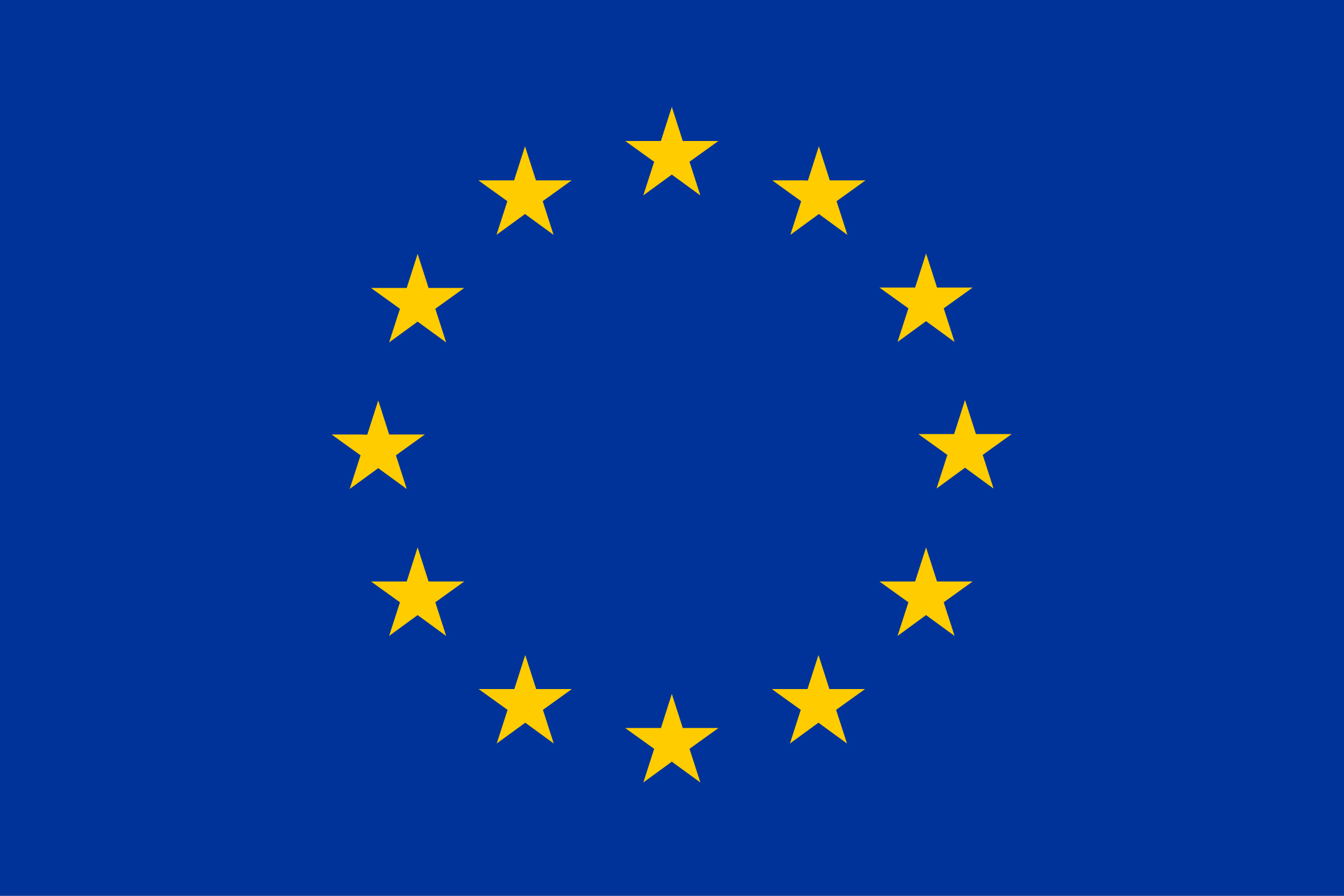We are excited to share with you our first blog post from Inuvik.
We (Samuel and Niek) are very excited to give you some insights into our activities, preparations and research program this summer. In this first entry you will get an overview of the teams, research focuses and the many, many preparations that are needed for a successful field campaign. Enjoy reading!
After some 48-hours of connecting flights from Potsdam, Berlin, Amsterdam, Vienna, Stockholm, Toronto and Lisbon the team arrived in Inuvik, North-West Territories, Canada, on the 18th of July. Inuvik is the home base where all of the researchers going to Herschel and beyond will travel to in order to get prepared, loaded up on food and supplies and to become acquainted with the far northern lifestyle. Inuvik has around 3000 inhabitants and is therefore considered a big city in the Arctic. During our stay the annual Great Northern Arts Festival and the 60th Birthday celebration of Inuvik are both taking place. What a timing. A special note, we must say we were also very impressed by the greenhouse in town providing fresh veggies and composting facilities to the whole community at 68°N!
Now to the team!
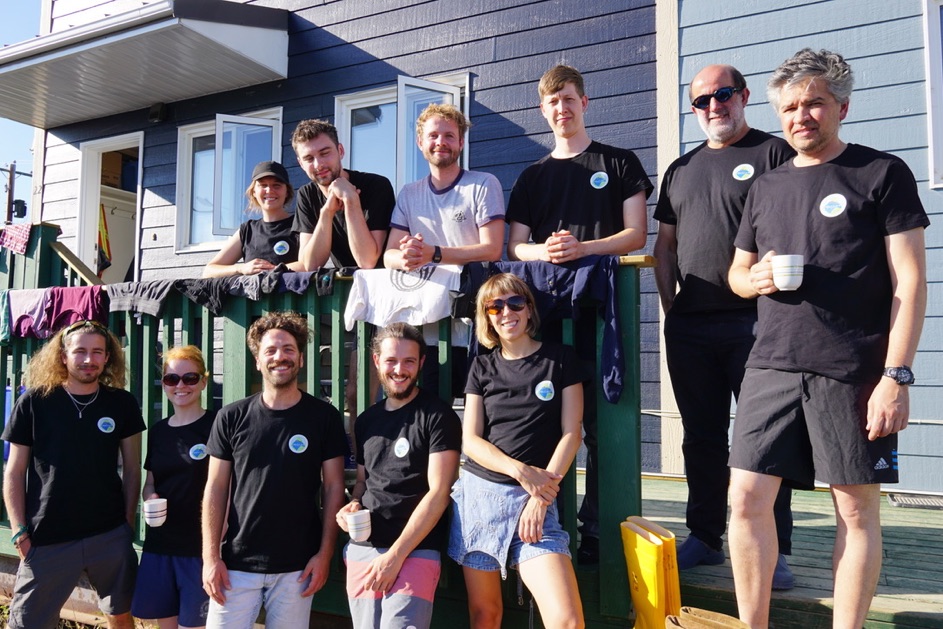
We are 12 researchers making up this year’s fabulous and dynamic team! Gonçalo and Pedro are from Lisbon University and will join us for one week on Qikiqtaruk to collect data from the air with their drones. We hope to show some amazing aerial shots of the Island in later posts. Jade and Leo are from the University of Quebec and will mainly work on the water doing surveys of the seafloor as well as taking surface samples of the sea floor. I (Niek) just started my PhD at the University of Amsterdam and will collect water and soil samples on Qikiqtaruk and also the mainland in order to understand carbon export from thawing permafrost landscapes. Julia is fascinated by Arctic Regions and just started her PhD at Stockholm University. In her master thesis she focused on spatial modelling of soil organic carbon stocks in West Greenland and she is very excited to continue her work now in the Canadian Arctic. George is our expedition lead from Alfred Wegener Institute (AWI) and will focus on sea water sampling for microplastic and organic carbon but is mainly trying to fulfil every team member’s many scientific dreams. Alison our vegetation expert and will do spectral measurements of vegetation communities on Qikiqtaruk with her monstrous spectrometer. She just finished her PhD at AWI and is also coordinating the flight paths of the AWI and GFZ-led airborne campaign that will collect LiDAR, hyperspectral and very high resolution aerial imagery for the Nunataryuk project. Konstantin just started his PhD at the University of Potsdam and the AWI and is interested in how the colour of the ocean is affected by suspended sediments in the sea water and how satellites observe these colours. There will be lots of time on the boat for Konstantin. Justus is here to do work for his master thesis and would like to know more about the interactions of waves and erosion of permafrost coasts. He will deploy instruments at the ocean floor that measure wave height. I (Samuel) also just finished my PhD at AWI and I will be responsible for the long-term monitoring sites on Qikiqtaruk and will help out with all groups and teams.
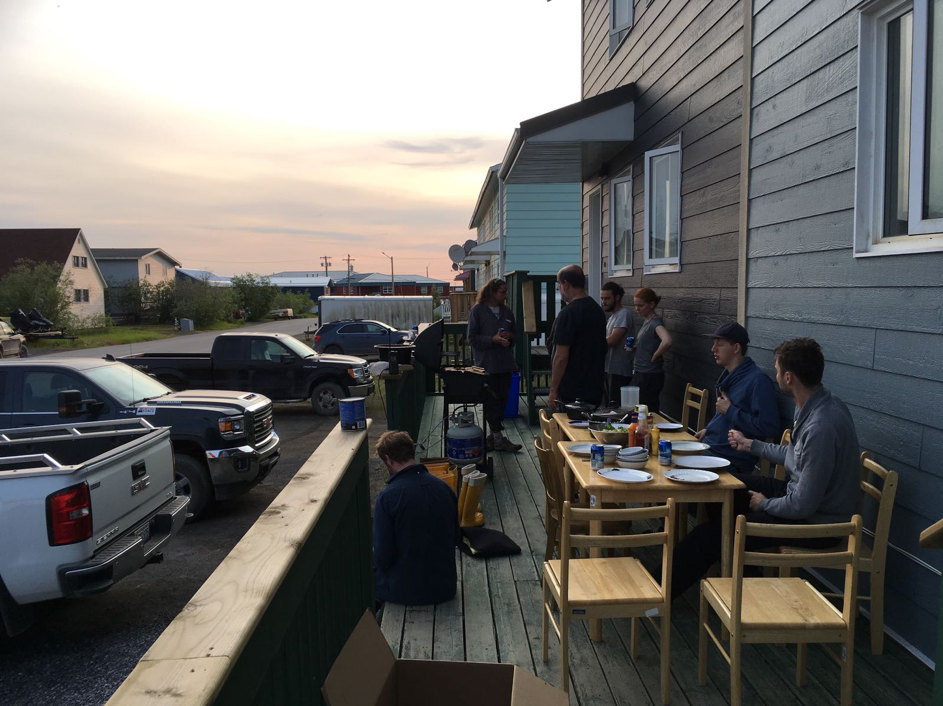
Puh, what a long introduction of people and what a long list of interesting projects. There will be more information on the different projects in the following blog posts. We are also very lucky to also welcome Frank to our team as a research assistant from the community of Aklavik in the Mackenzie Delta, just across the river from Inuvik. Frank will give us indispensable information about the landscape that he knows so well.
Given the superpowers of the midnight sun, we have worked a full 5 days and nights to get all the necessary preparations done while at the same time enjoying the warm weather, calm atmosphere and… Berliner dance moves on the floor of Mad Trappers Inn?
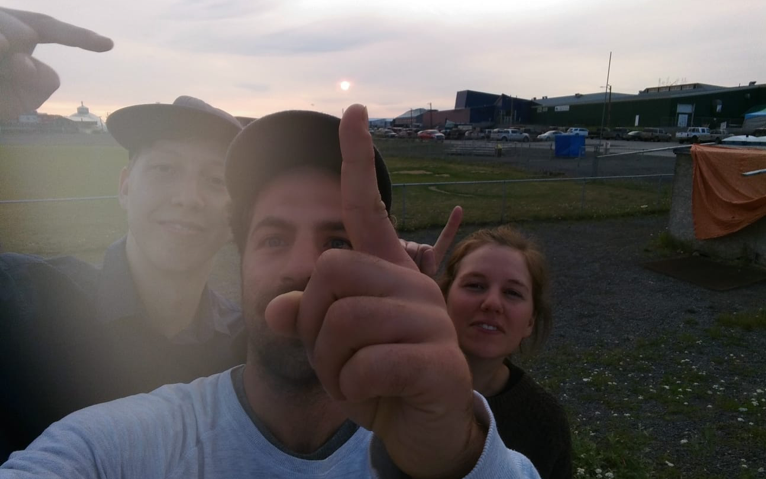
We have had 5 full days in Inuvik to prepare our 4 ½ week long stay in the field. During this time, we have a long list of tasks and boredom is not a concern! We met with many people in Inuvik who support our research through not only technical and logistical support but also personal experiences, which makes ours much easier. This includes the wonderful staff of the Aurora Research Institute who have been a partner for the research efforts of the AWI for over a decade and provide us comfortable housing for the time of our stay in Inuvik, as well as storage and equipment. Parks Canada is also helping us prepare by providing a brief history of the Inuvaluit settlement region and the parks within them as well as bear safety training. We are also so lucky to work with Richard Gordon, a project partner of Nunataryuk and the chief ranger of the Territorial Park of Qikiqtaruk (Herschel Island). Richard is an extremely important person for all the preparations and keeping things running smoothly on the island. His team of rangers on the Island are brothers Edward and Samuel McLeod as well as Ricky Joe and Shane Goesen that will be on the Island with us and give us guidance of how to best move through and plan our activities in the Park.
They say that a hungry polar bear can be a dangerous nuisance, but those people haven’t dealt with hungry researchers yet. To avoid mayhem under the midnight sun, a four-day long cookathon (or maybe cook-a-ton would be a better description) was organized. Preparing a delicious and warm meal for dinner in the field can be extremely time consuming when cooking for 12 people. Also, it is a challenge to store fresh vegetables and meat for such a long time. This means we precook most of the meals in Inuvik and let me tell you, this translates into a lot of cooking!
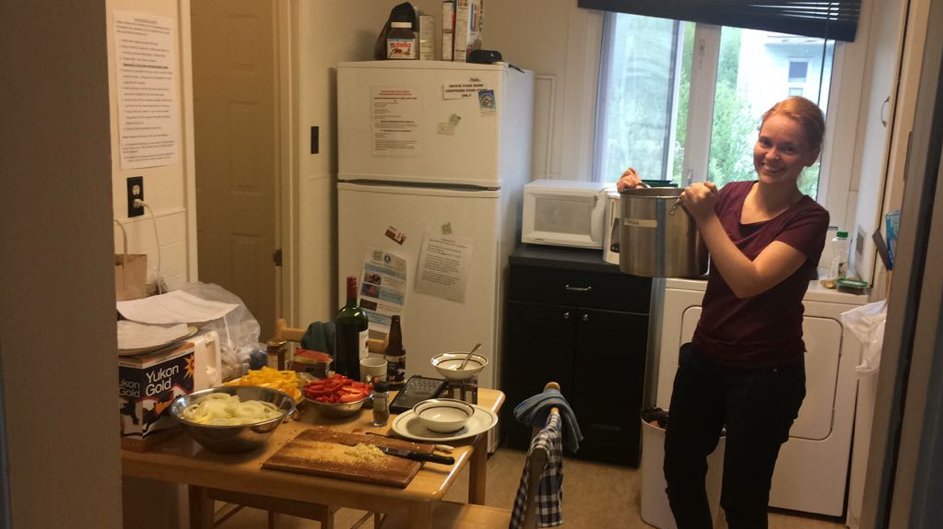
Niek and Konstantin collected everyone’s favourite recipes in many weeks ago and made possibly the longest shopping list of all time. The employees of the two local supermarkets helped us greatly with gathering and packing all of our needed groceries. Although most of them practical and suited for one-pan-preparation, some exquisite dishes were prepared over the course of the cookathon. Dishes such as “Caribeef bourguignon”, “Coq au vin Diesel” and “From Herschel with Love” (of which the recipe is included below) were among the creations of the expedition members. Being impregnated with heavenly smells from all the cooking, the team is now ready for take-off and can rest assured of a “deluxe instant meal” after a hard day’s work.
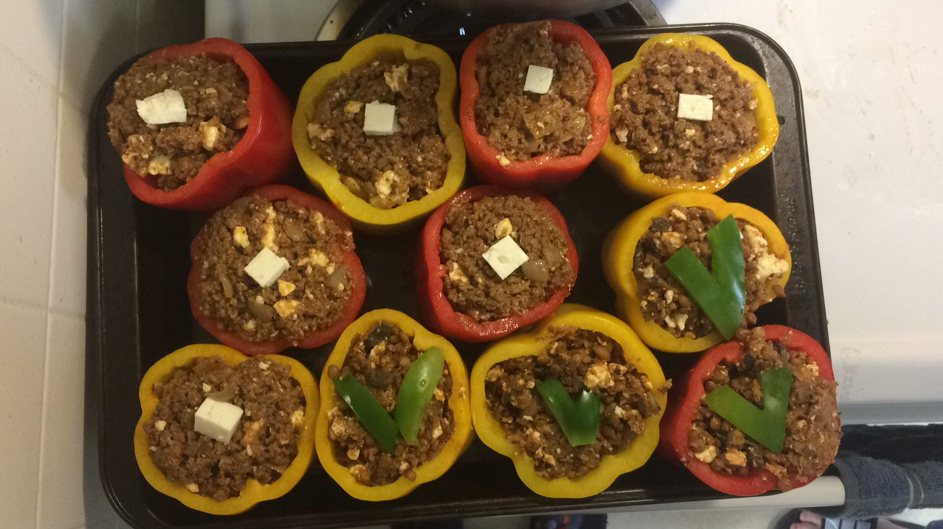
With so many people there is of course an amazing amount of scientific equipment that we have to bring with us to Qikiqtaruk. This means lots of unpacking and packing (more unpacking and packing, and even more packing and unpacking) to do. We shipped most of our equipment to Inuvik from AWI back in early June and by the time we arrived at ARI our gear was there! Once at ARI, we took over the entire loading bay. Because we will have a second camp this year on the mainland we have to bring many things in double. So, while one part of the crew is busy with chopping, cooking and freezing all the meals, Konstantin, Justus and I are spending most of our time in the loading bay of the ARI unpacking boxes, packing boxes, weighing boxes, labelling boxes, categorizing boxes, lifting boxes, piling boxes, moving boxes and … enough boxes.
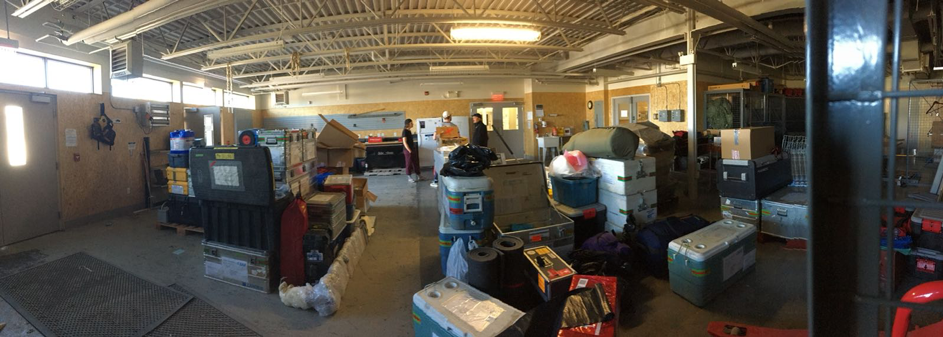
When everything was finally organized and included in our final flight planning list, we brought everything to the hangar of Aklak Air, the company that will bring us and our many, many boxes to Qikiqtaruk. Tomorrow, Monday the 23rd of July, we’ll be flying out to Herschel Island, our field basecamp from where all of the onward research ventures will be conducted. Interesting times are coming, stay tuned and keep your fingers crossed for us for good weather!!
From Herschel with love (a.k.a. the polar bear magnet) Ingredients downscaled for 4 persons:
0.5 kg of white fish fillet chunky pieces
0.5 kg of salmon in chunky pieces
1 can of clams (or any other type of seafood with its juice)
1 table spoon of tomato puree
1 big onion, roughly chopped
2 cloves of garlic (or more)
2 chalks of celery roughly chopped
1 leek
3 carrots roughly chopped
1 tomato roughly chopped
250 ml of white wine
2 bay leaves
1 table spoon of coriander seeds (crush lightly)
1 teaspoon of cayenne pepper (or more to taste, do spice it up,)
1 teaspoon of Celery seeds
1 tablespoon of dried parsley (doesn’t really grow up here)
2 teaspoon dried thyme
1 teaspoon dried marjoram
Big splash of olive oil
Black pepper
Sea salt
Cooking instructions:
Heat the oil on high heat and add onions and garlic, fry until glazed;
Add coriander and celery seeds as well as the thyme, marjoram and bay leaves, stir fry for 1 minute;
Add all of the vegetables and stir fry for about 5 minutes;
Add tomato puree and stir fry for a bit more;
Add the wine (tssssssssssshhh…. hmmm…);
Put on some music while the wine boils down a bit;
Add fish and clams including juice!;
Add cayenne pepper to taste and bring the contents of the pan to a simmer;
A good crunch of black pepper and salt to taste;
Taste!;
Check if I forgot any ingredients…
Simmer over low heat for about 25 to 30 minutes, or until all of the ingredients are cooked (not overcooked!);
Some dried parsley on top for the looks
Serve with bread or rice;
Enjoy!
----
Expedition Members:
George Tanski* Alfred Wegener Institute, Potsdam
Alison Beamish Alfred Wegener Institute, Potsdam
Konstantin Klein Alfred Wegener Institute, Potsdam
Justus Gimsa Alfred Wegener Institute, Potsdam
Samuel Stettner Alfred Wegener Institute, Potsdam
Niek Speetjens Vrije Universiteit Amsterdam
Jade Falardeau Université du Québec à Montréal
Leo Chassiot Université Laval
Gustaf Hugelius Stockholms universitet
Julia Wagner Stockholms universitet
Gonçalo Vieira Universidade de Lisboa
Pedro Pina Universidade de Lisboa
Francois Malenfant Geological Survey of Canada
Rachele Lodi Wien Universität
Andreas Richter Wien Universität
Victoria Sophie Martin Wien Universität
* Expedition leader



